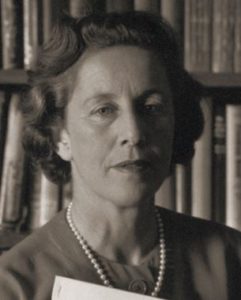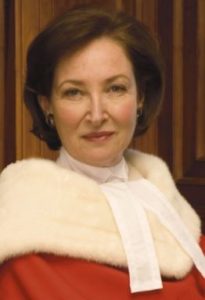The Woman That Ended Apartheid

Helen Suzman
Helen Gavronsky (1917-2009) was born near Johannesburg, South Africa to Jewish immigrants from Lithuania. She studied at Witwatersrand University, first commerce and then economics and economic history after marring Dr. Moses Suzman. During World War II, she worked as a statistician for the War Supply board, and assisted the Governor General’s War Fund. When the war ended she returned to university as a lecturer. She soon joined the South African Institute of Race Relations, and went on to study the conditions of black communities. It was then that she realized how much they suffered, and became an anti-apartheid activist. In 1953, Suzman was elected to the South African Parliament. Unhappy with how little her own party was doing for the cause, she co-founded the Progressive Party in 1959 with a platform to end segregation, and bring equal rights for all. By 1961, all other members of her party lost their seats, leaving Suzman as the only anti-apartheid MP for the next thirteen years. Throughout this time, she ate alone in the parliamentary lunchroom. Nelson Mandela would later say that she was “undoubtedly the only real anti-apartheid voice in parliament.” Suzman experienced tremendous anti-Semitism from her colleagues, as well as harassment from police, and threats on her life. She remained unyielding. In 1974, she finally got some support as six other anti-apartheid MPs joined the government. A year later, her party merged with the Reform Party, run by another Jewish anti-apartheid activist, Harry Schwarz. Together, the Progressive Reform Party became the official opposition by 1977. Suzman worked tirelessly to bring equal rights for all, including women and minorities. She regularly visited Nelson Mandela and other prisoners, and worked hard to improve their conditions. All in all, she served as an MP for 36 years, and continued to work in Mandela’s government afterwards. She served on the Human Rights Commission, and was twice nominated for a Nobel Peace Prize. She was awarded 27 honourary degrees, was knighted by the Queen in 1989, and given the golden Order of Merit by Mandela in 1997. Suzman was voted among the greatest South Africans in history. Later in life, she did admit that South Africa did not go in the direction she thought it would, and strongly criticized the African National Congress, who did little to improve the country. The party that Suzman founded, now known as the Democratic Party, is currently the official opposition in South Africa.
What Separates Judaism from Other Religions?
Words of the Week
He who restrains his anger will not see his enemies rule over him.
– Rebbe Nachman of Breslov

 Rosalie Silberman Abella (b. 1946) was born to Jewish-Polish Holocaust survivors in a displaced persons camp in Germany. When she was a child, the family moved to Halifax, and then settled in Toronto. Abella followed in her father’s footsteps and became a lawyer, graduating from the University of Toronto. She was a civil and family lawyer for five years before being appointed to the Ontario Family Court, aged just 29. This made her the youngest judge in Canada’s history – and the first pregnant one! Sixteen years later, she moved up to the Ontario Court of Appeal. Abella also sat on Ontario’s Human Rights Commission, and became a renowned expert on human rights law. Abella coined the term “employment equity” while overseeing the Royal Commission on Equality in Employment in 1983. She pioneered a number of strategies to improve employment for women, minorities, and aboriginals, which have been implemented in countries around the world. In 2004, she was appointed to Canada’s Supreme Court, making her the first Jewish woman to sit on the nation’s highest judiciary. Recently, Abella was named the Global Jurist of the Year for her work with human rights and international criminal law. Among her many other awards, she has received 37 honourary degrees, including one from Yale University – the first Canadian woman to do so. One politician said of her: “I’ve never met any judge in my life, and I know a lot of them – I used to be a lawyer – who understands people better than Rosie, and the importance of people in the judicial process. I think the human quality she brings to the bench is unsurpassed in my experience.”
Rosalie Silberman Abella (b. 1946) was born to Jewish-Polish Holocaust survivors in a displaced persons camp in Germany. When she was a child, the family moved to Halifax, and then settled in Toronto. Abella followed in her father’s footsteps and became a lawyer, graduating from the University of Toronto. She was a civil and family lawyer for five years before being appointed to the Ontario Family Court, aged just 29. This made her the youngest judge in Canada’s history – and the first pregnant one! Sixteen years later, she moved up to the Ontario Court of Appeal. Abella also sat on Ontario’s Human Rights Commission, and became a renowned expert on human rights law. Abella coined the term “employment equity” while overseeing the Royal Commission on Equality in Employment in 1983. She pioneered a number of strategies to improve employment for women, minorities, and aboriginals, which have been implemented in countries around the world. In 2004, she was appointed to Canada’s Supreme Court, making her the first Jewish woman to sit on the nation’s highest judiciary. Recently, Abella was named the Global Jurist of the Year for her work with human rights and international criminal law. Among her many other awards, she has received 37 honourary degrees, including one from Yale University – the first Canadian woman to do so. One politician said of her: “I’ve never met any judge in my life, and I know a lot of them – I used to be a lawyer – who understands people better than Rosie, and the importance of people in the judicial process. I think the human quality she brings to the bench is unsurpassed in my experience.”